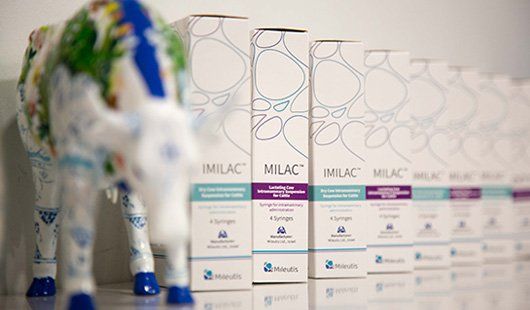Bovine mastitis is an infectious disease that wreaks havoc in the mammary glands of cows. If left untreated, it can cause severe and lasting damage to udders and can be fatal.
For dairy farmers trying to optimize milk production, mastitis is proving a major problem. It is the most frequent disease in dairy herds worldwide – and the most costly. The University of Glasgow reckons yearly financial losses from the disease are between $19.7 billion to $30 billion.
Standard treatment or prevention involves a course of antibiotics. It’s an approach that’s getting more controversial as scientists warn of rising microbial resistance to existing antibiotics. Resistance is already a major global health problem and causes one death every 15 minutes in humans in the US alone, according to the country’s Centers for Disease Control & Prevention. That is one reason regulators and consumers are getting wary of their overuse in livestock farming.
In response, animal health companies are on a drive to develop technologies that protect immune systems in a way that is more efficient, more effective and above all, still safe for both cow and consumer. One answer, already prevalent in human medicine, is “host defense peptides.” These are small proteins that effectively mimic the role of the immune system’s antibodies, or prod an immune system into rapidly producing more of its own.
In North Carolina, one company is looking overseas to help turn the tide toward peptides. Life sciences and healthcare investment firm NovaQuest last week made its first foray into animal health, signing a $20 million peptide product development deal with Israeli biotech company Mileutis.
As part of the collaboration, Mileutis plans to introduce its peptide product Imilac to market. The team say it will be used in the management, treatment, and prevention of bovine mastitis at ‘dry-off ‘- a key phase in the cow’s lactation cycle, and exactly when a the animal’s immune system may need an extra boost to ward off infection. The process is based on early research conducted by Israel’s Agricultural Research Organization, Volcani Center and Mileutis.
The company predicts potential annual revenue of above $1 billion globally, and has expressed further confidence in these projections since the European Medicines Agency (EMA) issued an opinion on residues of animal health products present in food. The EMA opinion appears to recognize that products such as Mileutis’s, which consists of casein hydrolysate, does not require a maximum residue limit evaluation – something that would have stalled market acceptance.
Rather than terming these as a new generation of antibiotics, Mileutis CEO David Javier Iscovich said in a statement that peptide products like these represent “safer biopharmaceuticals” which will “protect animals and save people from the health [issues] associated with the development of antibiotic resistance.”
His company’s platform “will pave the way towards the development of additional therapies for both animal health and human health,” he added.
NovaQuest principal Brian Axe told AFN he sees this product line and platform as representing “a paradigm shift much needed in the industry.”
He said it will “not only improve animal and human health by enabling more sustainable milk production, but will also enhance the wellbeing of dairy cows.”
Other companies are working on more direct and fundamental ways to turbocharge immune systems, such as through gene editing. “We’re also looking at improving swine health against instances of foot and mouth disease, and the need for antibiotics as consumers increasingly demand antibiotic-free food,” Mitch Abrahamsen, founder of Minnesota startup Acceligen, told AFN last year. “We can use our technology to address what the consumer wants.”




